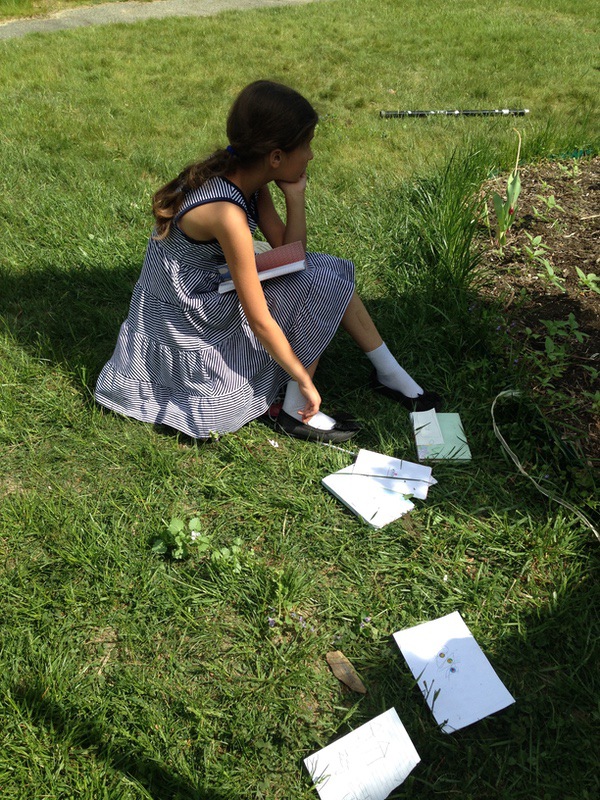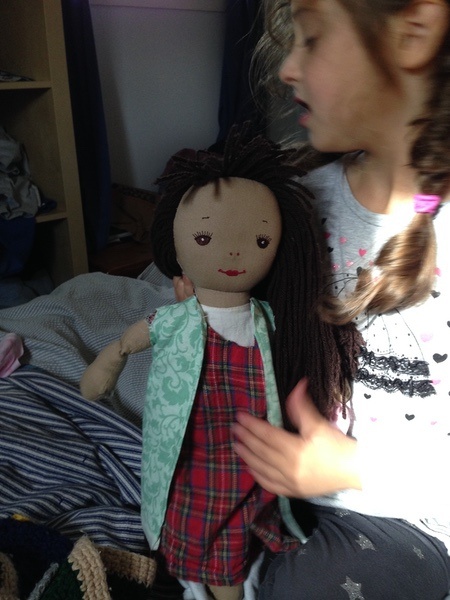I’ve been meaning to go in for a while. The ever-changing array of colorful children’s toys, strollers and the like that line the sidewalk in front of the store have been calling me for some time. But i’m always hurrying from one place to another when I drive down that particular stretch of road. And it’s just the kind of place that’s hard to turn in to on a whim: busy street, no off-street parking, and i can never remember exactly where on that stretch of road it is. But today I finally made it.
I found two pairs of shoes for a total of $5: cute little white sneakers, velcro-close with pink piping, and plum-colored leather Mary Janes with thick rubber no-skid soles. Just what Bella needs to round out her fall wardrobe! We’d got a whole bunch of clothes from her cousin Theresa who’s a year older; but Bella evidently has big feet because they’re wearing the same sized shoes. We’ve been making do with her sandals because we’re having an unseasonably warm October; but any day now the weather could change.
As I was checking out, I spied a cute little Raggedy Ann doll grinning at me from a shelf crowded with dolls and stuffed animals. I love Raggedy Ann as one of my childhood’s dear companions. “How much is she?” I asked. One dollar got her off the shelf and into the bag with the shoes. I handed her to Bella when I got to the car and she was promptly snatched and hugged. I think we have another winner.







Interestingly, I just had the task of explaining this (sort of) without making reference to Christianity (at least, without making passing reference to the fact that the author makes reference to Christianity—you know, secular university and all). The author—Tolkien. The work—“On Fairy Stories.” This, in fact, is his definition of the “happy ending”—the eucatastrophe. Though Tolkien would say that we all need this—not just children. You’ve probably read “On Fairy Stories” and know all about this, but I’ve been having fun thinking about it. I actually talked about the Christian meaning of the “happy ending” in terms of “tapping into the Divine” and so partaking in something that is greater than we are and truly becoming “sub-Creators” as Tolkien says. It’s a very Catholic concept—wedded to his sacramental view of the world, one might say.
I have been thinking about formulas in children’s fantasy lately—because everything “up-and-coming” for my son’s age range is fantasy, and I’m skeptical of them all. What I’ve noticed is this trend: Child in worse-than usual ordinary circumstances finds it hard to cope with reality. Child is whisked from the ordinary world to the fantasy world, where s/he discovers that s/he has some kind of power, special ability, or calling that makes him or her special. Child uses this special ability/power/calling to combat odds and fulfill his/her destiny. S/he then returns to the real word, where s/he is better able to cope. Like the one you describe, it’s a happy ending or sorts, but like the one you describe, the message is to come to rest on your own merits. It’s not inspiring in the way that stories should be, and it doesn’t strive for the infinite. But I’m hard pressed to find examples that fulfill Tolkien’s requirements—other than those written by Tolkien himself!!
Like the one you describe, it’s a happy ending or sorts, but like the one you describe, the message is to come to rest on your own merits. It’s not inspiring in the way that stories should be, and it doesn’t strive for the infinite. But I’m hard pressed to find examples that fulfill Tolkien’s requirements—other than those written by Tolkien himself!!
Literacy-chic, that trend you outline is exactly the plot of Harry Potter! But I’m sure it’s a lot older than HP because I remember it from my own youth.
In a way the idea of “be happy the way you are” strikes me as something out of “1984” where Big Brother’s newspeak tries to placate the proles into believing that the status quo is perfect. I’m not suggesting a monolithic conspiracy, just a weird trend.
It also sounds weirdly like someone taking the “God loves you just the way you are” axiom too far. Yes, He does, but He also loves you enough to pull you out of the garbage pit you find yourself in.
Indeed I had two things in mind as I was writing this: Tolkien’s “On Fairy Stories” and Heaven: The Heart’s Deepest Longing by Peter Kreeft. The Kreeft book, which I’ve been working my way through slowly for months now, also cites Tolkien’s essay. It’s definitely a very Catholic idea. Interesting to me by contrast how many Protestants are very wary of fairy stories.
You’re right of course that we all need it, but the focus of the original post I was linking to was kids’ movies.
I’ll have to think about that last challenge… stories that live up to Tolkien’s requirements. Right now nothing is coming to mind; but I know I can think of some good ones.
I think someone took God out of the “God loves you exactly the way you are”!! Yes, it is definitely the plot of Harry Potter. But my son keeps bringing home Scholastic book order forms (which used to be really good) and the plot of every other recently published children’s book is the same! I would imagine that it is a much older plot. It’s the dominance of it that gets me!! I hadn’t thought of 1984. Interesting connection!
Melanie—Kreeft is an excellent writer and has written on Tolkien himself! I would imagine that this is a great book! I do enjoy “On Fairy Stories.” I suspected that you knew it well! I don’t think we necessarily need the kind of thing in the movies… I’m thinking “The Princess Diaries” & such from your original post. The original Disney animated movies have much more value than the newer varieties.
If you could come up with stories that live up to Tolkien, I would be thrilled!! I don’t know that I could think of any! Make sure you let me know when you post some!
Speaking of Disney movies, how about The Incredibles? Here you have a nuclear family (mother, father, three kids) who are called to stop hiding their God-given talents for the betterment of society. I think all is not lost yet.
I have to say that I’m not very current on recently published children’s books. I’ve been spending much more time recently digging up oldies but goodies. I have however spent a little time browsing the shelves at the bookstores and have been pretty depressed by what I’ve seen.
Kreeft’s book on Tolkien is actually on my list to buy next. When I’ve finished the two books of his sitting on my to be read shelf.
I didn’t actually see the Incredibles, but I think that Pixar is a slightly different caliber (in spite of anything I might have said about Toy Story recently, and in spit of the fact that I found Monsters, Inc. boring and elements of Finding Nemo a little bothersome. . .). I’ll have to try The Incredibles!
I’m having a hard time finding—or remembering—the oldies-but-goodies. Either that, or my son has read them all. I think I’ve read essays on Tolkien by Kreeft, but not a whole book. I haven’t read a book on Tolkien yet that did what I wanted it to do… I’ll let you know when I figure out what that means!
Jumping in late, but I enjoyed this post.
I’m a Protestant who adores fairy stories. As a (children’s) writer I would guess that the reason for all the protagonist-centered stories is rooted simply in the grand illusion that “Man is the center and measure of all things.”
I am already wondering of there will be a positive reception for my (more traditional) fairy tale novel, as it involves the protagonist learning her absolute *lack* of adequacy alone. The story is more about recognizing the power of community and cooperation (a common theme in FTs): different people having different strengths. But it flies in the face of what you describe here:
The power-to-the-individual dogma.
It just reinforces humanism. This is where knowing the world-view of your stories becomes so important. Wheat we read really does affect the way we think.